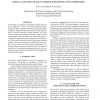Free Online Productivity Tools
i2Speak
i2Symbol
i2OCR
iTex2Img
iWeb2Print
iWeb2Shot
i2Type
iPdf2Split
iPdf2Merge
i2Bopomofo
i2Arabic
i2Style
i2Image
i2PDF
iLatex2Rtf
Sci2ools
ICIP
2005
IEEE
2005
IEEE
Critical encoding rate in combined denoising and compression
In this paper, we elaborate on denoising schemes based on lossy compression. First, we provide an alternative interpretation of the so-called Occam filter and relate it with the complexity-regularized denoising schemes in the literature. Next, we discuss about the `critical distortion' of a noisy source and argue that optimal denoising is achieved at the corresponding critical encoding rate rather than at the encoding rates suggested by other compression-based denoisers. Finally, we discuss the so-called `indirect rate distortion problem.' We focus particularly on the high bit-rate encoding of noisy sources and show lossless compression of a denoised source is often very wasteful of bits, and suggest a simple way of determining an appropriate bit-rate for compressing a denoised source economically while retaining its initial denoised quality.
Related Content
| Added | 23 Oct 2009 |
| Updated | 14 Nov 2009 |
| Type | Conference |
| Year | 2005 |
| Where | ICIP |
| Authors | Sehoon Yea, William A. Pearlman |
Comments (0)

